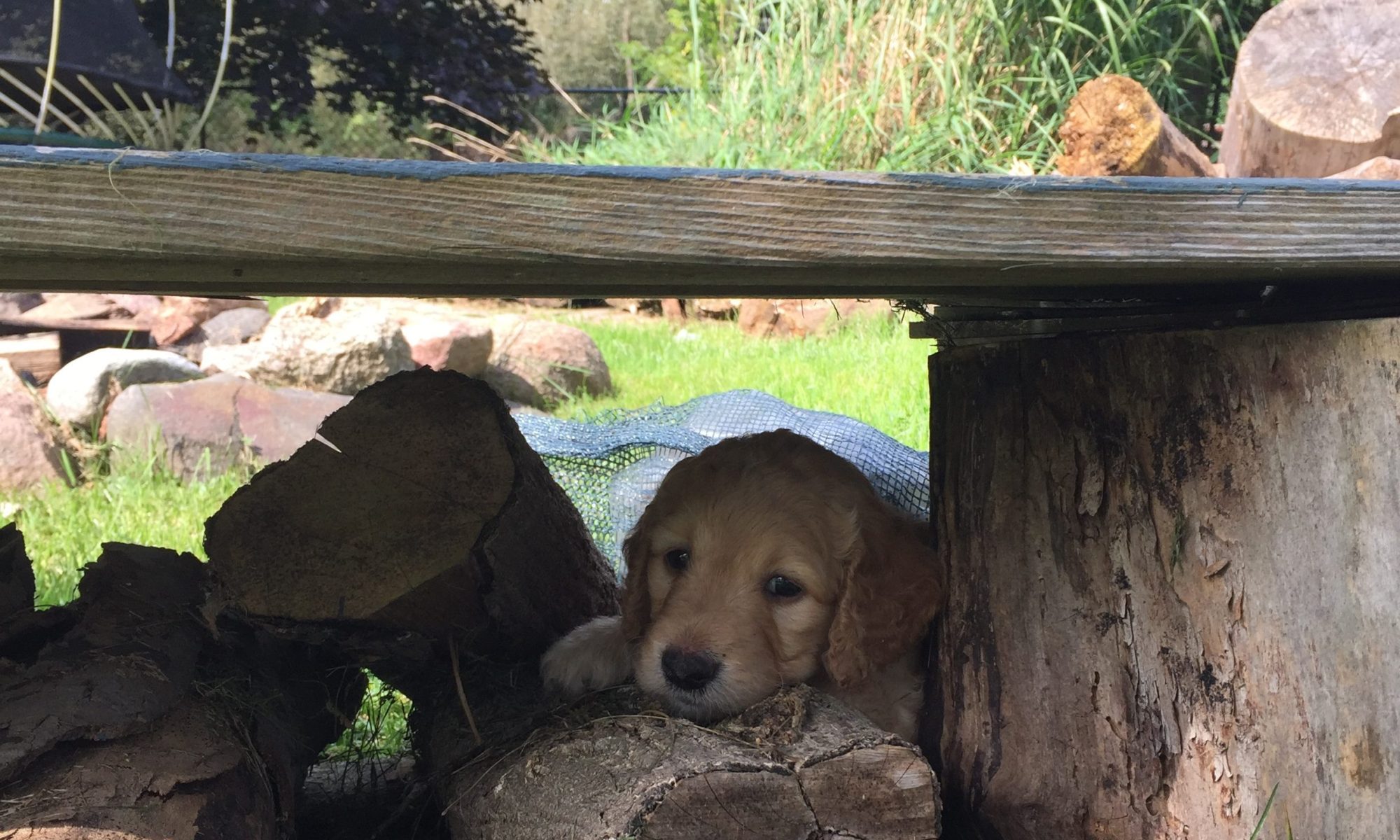
Whelping Day

It was a long night of Piper being restless. I drifted in and out of sleep, checking on Piper. When morning came, Piper went out for a potty break and rested calmly on the couch with me. She wanted outside again, but this time, she went under our deck stairs in the yard and wouldn’t come when called. I put my coat and boots on and headed out to coax her. But no luck, she refused to come out. I finally attached the leash to her collar and, with great effort on my part, pulled her out.
Piper was now very dirty from digging, and I was exhausted. The plan was to put Piper in the whelping box while I recovered with my first cup of coffee. Then, I would take Piper in the shower to clean her off. I had coffee with my daughter, and thirty minutes later, at 9:45 am, we headed upstairs to check on Piper.


Part-way up the stairs, my daughter said, “I hear puppy squeaks; she has had a puppy.” We quickly headed to the whelping room, discovering that Piper had delivered four puppies.
We quickly acted, trying to replace the dirty vet bedding before another puppy arrived. Piper was a little protective of her new babies, so I decided to wait before checking them out. While Piper delivered the next puppy, I took the opportunity to check out her first four puppies. This is when I made a mistake. I had three brown puppies and must have looked at one puppy twice. I recorded four male puppies when, in fact, we had three males and one female. It wasn’t until after I sent the announcement out and we put collars on the litter that we discovered my mistake.
The rest of the whelp went on very smoothly. The fifth puppy arrived at 10:18 am and the sixth at 10:31. Piper then had a seventy-nine-minute whelping pause. This is a common occurrence in larger litters. It gives the mama a rest and a chance to care for her puppies. Piper delivered her last four puppies, the seventh and eighth, at 11:50, the ninth at 11:58 and the tenth at 12:24 pm.
It is hard to say how long the whelp took because I didn’t observe the first four puppies’ arrival. However, I do know that Piper did a fantastic job delivering her ten babies. She was so calm and delivered each puppy effortlessly and without a sound—just like her Grandma, Ruska. Well done Piper!
Can you find all the puppies?

Caring for Piper
It is essential to care for our mamas so that they, in turn, can care for their babies. It starts with prenatal care, which includes feeding high-quality food and continues with postnatal care.
Special Treats
After whelping, our mamas don’t have a big appetite. We want to encourage them to eat to regain strength and care for their babies.
Their first few meals are boiled chicken breast. We also made a special treat called Mother Pudding. It is full of protein and calcium to give her energy and help her regain her strength. All our mamas love this pudding and are willing to eat it even if they are not ready to eat anything else yet.
Оху Momma
We start our mama dogs on a supplement called Оху Momma, a postnatal Vitamin that supports lactation and recovery. High-quality food and plenty of fresh water are a must to produce milk to feed her ten babies. Piper made a quick recovery and had a good appetite soon after birth.

Caring for the puppies
Before puppies are born, they receive immunity and everything they need to grow from the placenta. After birth, newborn puppies do not possess immunity. A mother’s first milk, colostrum, is a protein-rich, nutritious, balanced, and protective food. The special milk provides passive immunity, which can last several weeks and protect them from various infections and diseases. For this reason, in the first twelve hours after birth, the puppies must nurse frequently and build up their passive immunity. (Passive immunity is short-term immunity that results from introducing antibodies from the puppy’s mother. Compare this with active immunity – the immunity which results from the production of antibodies by the immune system in response to the presence of an antigen
Expert Nursers

Puppies are born with their eyes and ears sealed shut; they cannot see or hear. They must rely on “smell” and “touch” to find their mother. Puppies are born with a natural instinct to nurse, but they become more proficient as the days pass. The puppies are now experts at nursing! As you watch the video below, listen to the cute little sounds the puppies make as they nurse – so precious’s
Piper is a dedicated mama. She has a large litter of ten puppies and is doing an amazing job feeding them. For the first two weeks of their lives, we weigh them daily and keep records to track their progress. All the puppies are doing very well and gaining weight daily. Good job, Piper!

Keeping the puppies warm
Newborn puppies cannot regulate their own body temperature, so they depend on their mother and littermates for warmth. For the first few days, Piper spent all her time in the whelping box, feeding and caring for her babies and keeping them warm.
The whelping room has an electric heater that keeps the temperature around 28 degrees. Under the whelping box, there is a large heating pad. This keeps the puppies warm when Piper is away.


We gradually reduce the room temperature as the days pass.
Now that the puppies are a little older, Piper will rest on the elevated bed outside the whelping box. She also spends some time downstairs with us for a little break. It is not long before she wants to head back to her babies.
Puppy Pics
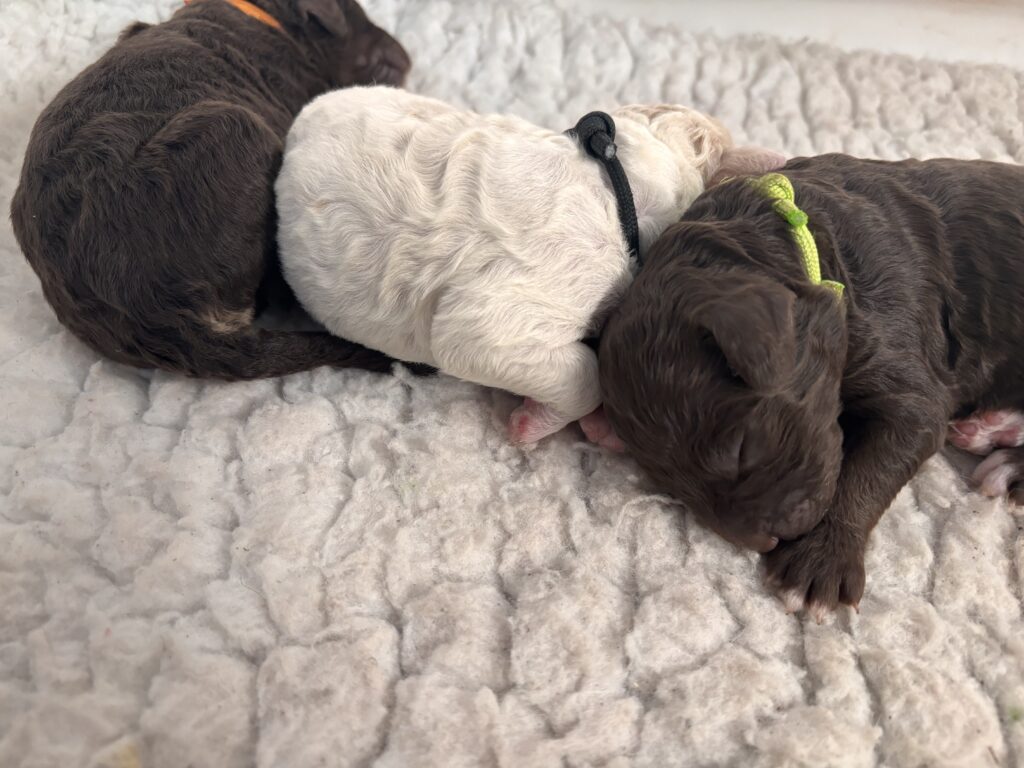

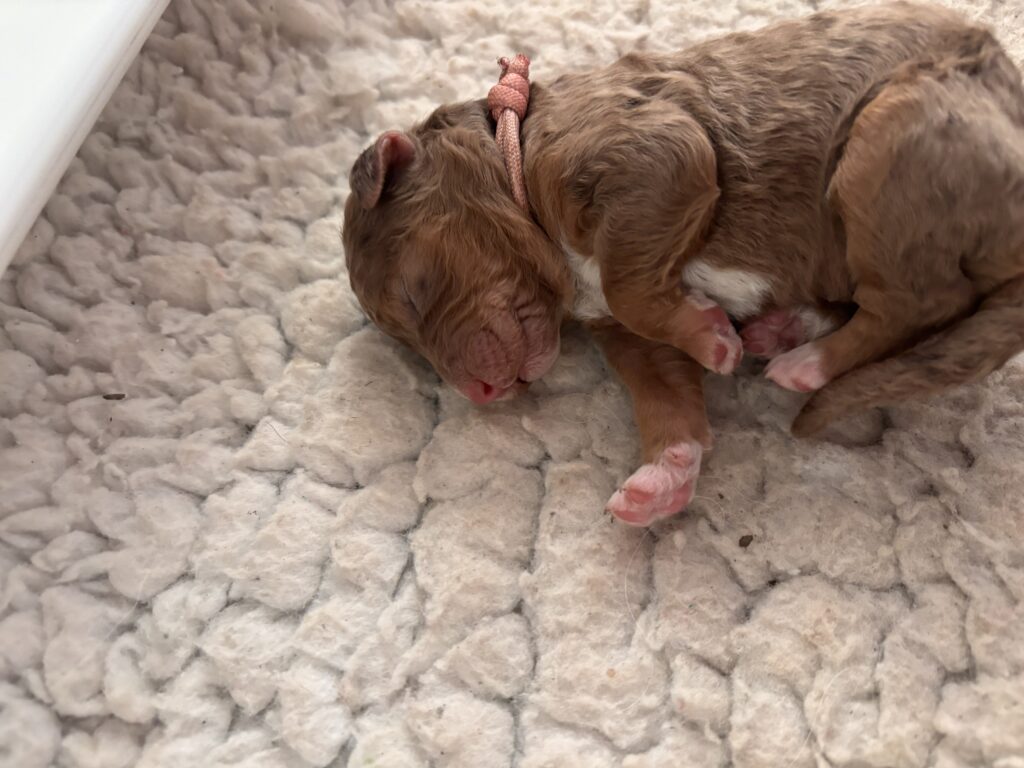




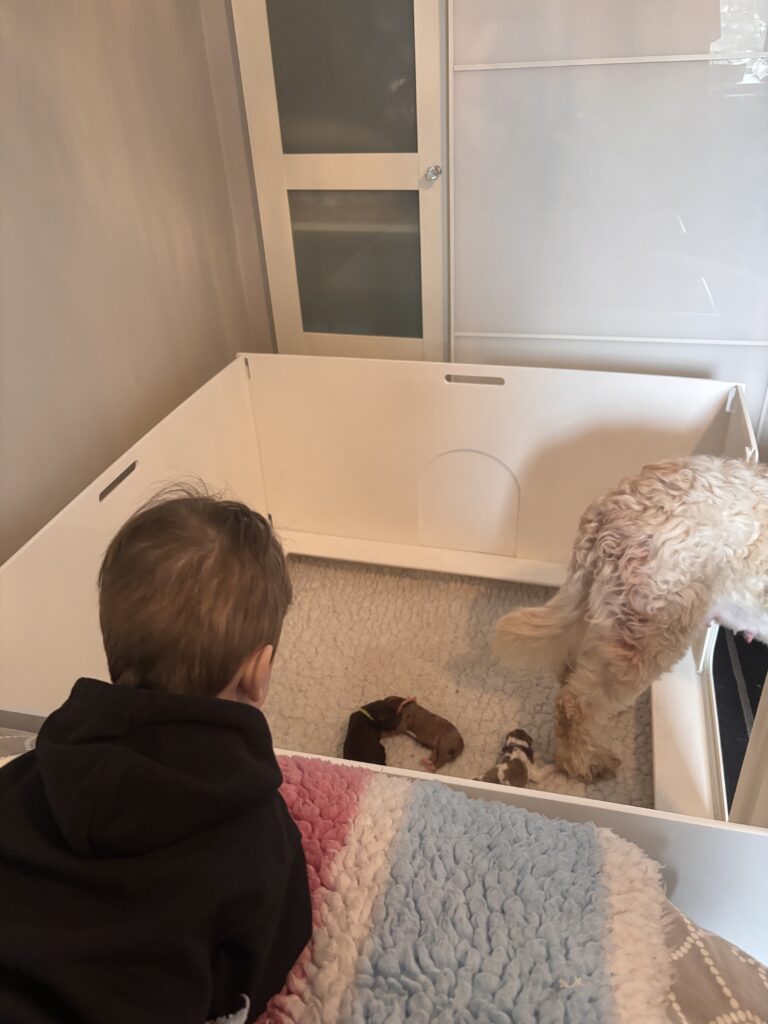
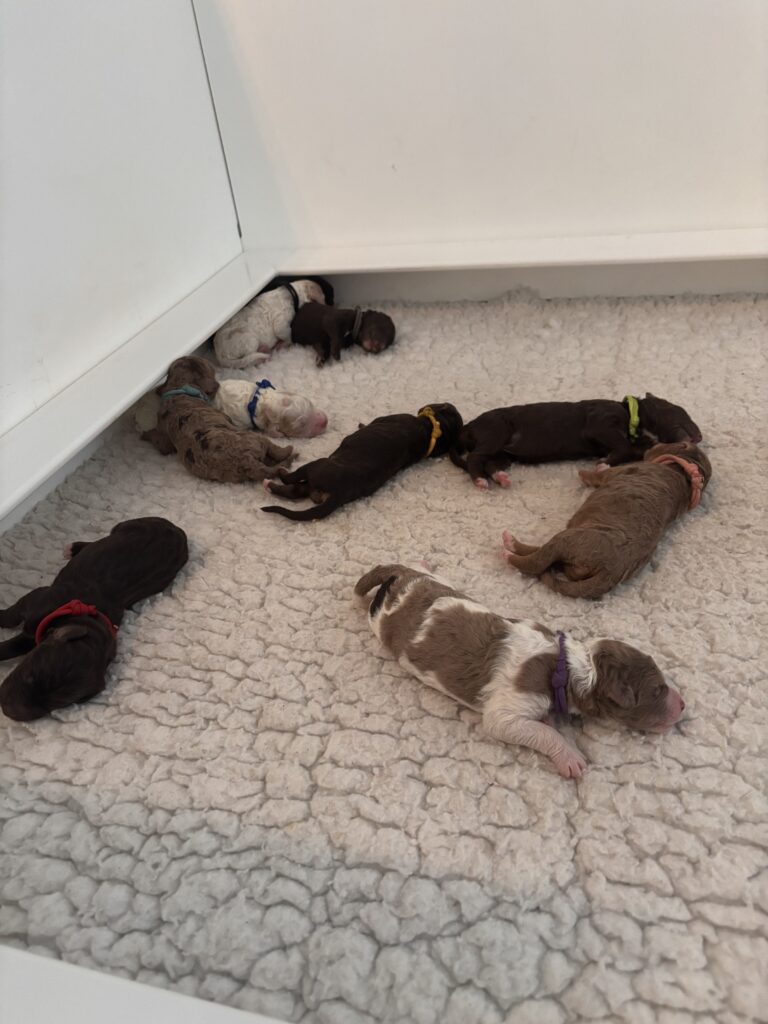


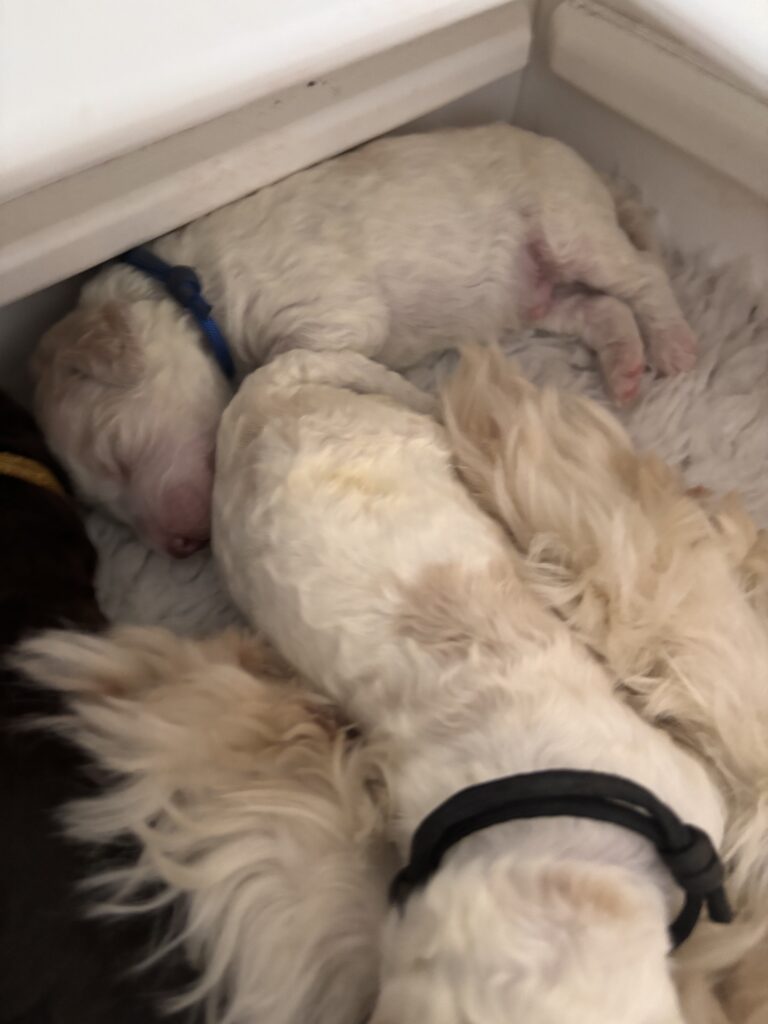

Neonatal Period
The puppies are in the Neonatal Period which is from day 0 to day 14. During this period, puppies spend their time eating and sleeping. On Monday, day 3, we began ENS exercises (Early Neurological Stimulation) which will continue through until day 16. We preform ENS daily during our weigh-in time. Research shows these tiny struggles and stresses in small doses are good for puppies. Research shows that benefits from ENS include greater tolerance to stress, greater resistance to disease, faster adrenal system, stronger heart rate and stronger heartbeat. This is a gift that a breeder can only give their puppies during the 3 to 16-day window.
Puppies continue to receive lots of handling to become accustomed to the human touch. Part of the “Puppy Culture Protocols” that we follow when raising our puppies is socialization. I am blessed with a large family that love to hold our puppies.
LOOKING AHEAD TO WEEK TWO
- Much the same as week one – Eat, Sleep, Repeat!
- Puppies will continue growing
- Puppies still crawl; hind legs will become stronger
- Eyes should begin to open towards the end the week – so exciting !!!

